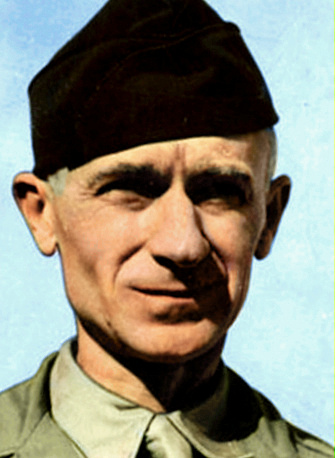Germans face disaster in north
Little to prevent tank breakthrough
By Richard McMillan, United Press staff writer
…
Little to prevent tank breakthrough
By Richard McMillan, United Press staff writer
…
The colonel, a French Ma’amselle and he outwit Nazis at Nixon
By Kaspar Monahan
…
But when actors appear ‘emptiness’ changes to bustling life and action
By Maxine Garrison
…
General says he expects Allies ‘to lick everybody they come up against’
By Ann Stringer, United Press staff writer
…

By Ernie Pyle
IN THE WESTERN PACIFIC (delayed) – We were up an hour and a half before daylight, for our planes had to be in the air at the first hint of dawn.
The first patrol was always launched by catapult, because in the wind-swept semi-darkness, it was too dangerous for them to make the run down the rolling deck.
After seeing the flight launches the first few days, it became old stuff, and I would have stayed in bed and ignored it, but that was impossible. The catapult’s huge launching machinery was directly above my cabin, and every time it shot a plane off it was just as though the Washington Monument had fallen on the ship. Rip Van Winkle himself couldn’t have slept through it. So, I just got up.
The fighter pilots were given their last briefing. In the “ready room” the squadron commander and intelligence officer showed them on maps and by drawings on the blackboard, just where they would strike.
The squadron commander asked how many of the pilots had no wrist watches. Six held up their hands. The funny part was that the ship had no extra wrist watches, so I don’t know why he asked the question in the first place.
Then he told what our approximate total of planes over Japan would be, and how many it was probable the Japs would put up against us. And then he said: “So you see, each one of us will only have to take care of three Jap planes!”
Constant blanket of protection
The pilots all laughed and looked at each other sheepishly. (Days later, when the final scores were in, we found our force had destroyed Japs at nine-to-one.)
And at the end of his briefing, the squadron commander gave strict orders for the pilots not to shoot at Japs coming down in parachutes.
“They’re supposed to do it to us,” he said, “but it isn’t the thing for us to do.”
The bomber pilots and their enlisted gunners and radiomen were briefed the same way. After the intelligence officer had finished, the squadron commander said:
We’re going to dive low on the target before releasing our bombs. Since we’re risking our necks anyhow, there’s no point in going at all unless we can do some damage, so go down low.
All through the various strikes on Japan, our task force kept enough planes back to fly a constant blanket of protection in the sky above us.
I remember the funny sign chalked on the blackboard of the “ready room” the first day, urging our patrol pilots to extra vigilance for Jap planes that might sneak out from the mainland to attack us. The sign said: “Keep Alert – Remember Your Poor Scared Pals on the Ship!”
‘Sits’ on Jap sub all day
We didn’t know whether our first planes over the mainland would surprise the Japs or not. It didn’t seem possible, yet there were no indications that they knew.
For two days on our approach, we had been knocking off Jap reconnaissance planes and picket boats. We hoped we had got these scattered planes and boats before they had time to radio back home the news of our presence. One of our destroyers had even sat all day on top of a Jap submarine to keep him from coming to the top and sending a warning.
But still we didn’t know for sure, so there was tenseness that first morning. We knew almost exactly what time our first planes would be over the Tokyo area.
We went to the radio room to listen. The usual Japanese programs were on the air. We watched the clock. Suddenly – at just the right time – the Jap stations all went off the air.
There was silence for a few minutes. And then the most Donald Duck-like screaming and jabbering you ever heard. The announcer was so excited you had to laugh.
We knew our boys were there. After that, for us on the ship, it was just a matter of waiting, and hoping. And as the blackboard sign said, of being poor scared pals.
Yanks, Aussies transported to stop Japs
By Lee G. Miller, Scripps-Howard staff writer
…
Misunderstandings strain relations
By William Philip Simms, Scripps-Howard foreign editor
…
By Gracie Allen
Well, it’s beginning to look as though everyone but Mrs. Roosevelt has crossed the Rhine in the last few days.
The Nazi Wehrmacht was astounded at the ease with which the Americans crossed that mighty stream. Little do they know the years of training our boys have had.
Why, crossing the Rhine is nothing compared with trying to get across the streams of traffic on Michigan Boulevard during the rush hour – or Hollywood Boulevard on Saturday night – or Broadway at any time.
And speaking of traffic, wait till some of our Sunday drivers, now driving tanks, start chasing Nazi pedestrians around Inner Germany. I asked George if the Americans were the first to cross the Rhine, and he said, no, a fellow named Caesar did it a long time ago, but came to a bad end.
It seems Caesar was stabbed by his best friend. Of course, Hitler doesn’t have to worry about that. You can’t be stabbed by what you haven’t got.
…
…
Cash will be used to help small business
…
…